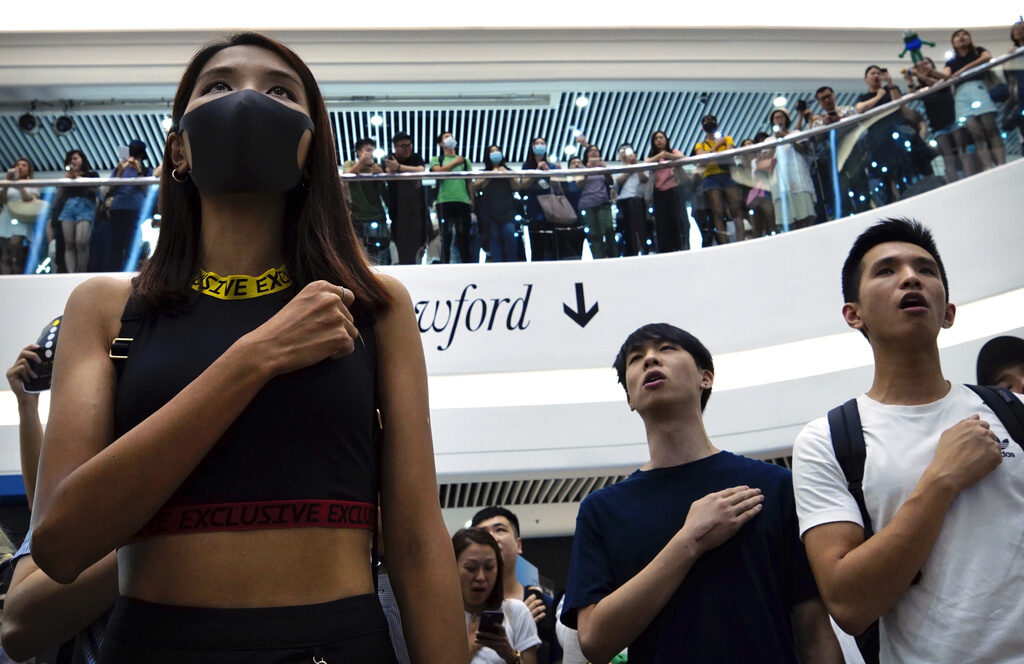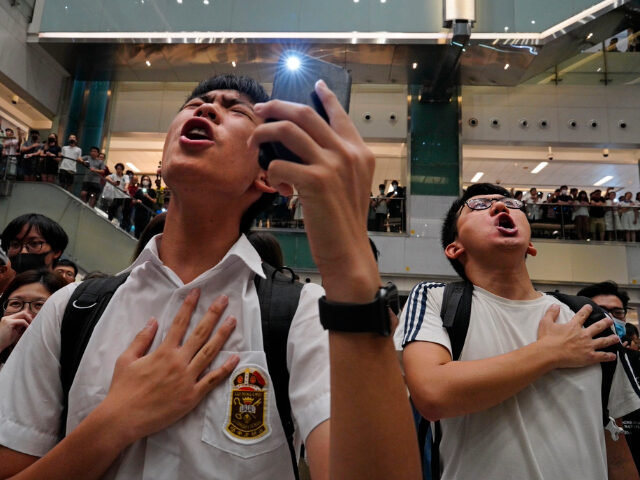Hong Kong’s Court of Appeal on Wednesday ruled in support of a demand from the island’s Communist-controlled puppet government to ban “Glory to Hong Kong,” the unofficial anthem of the massive 2019 pro-democracy protests.
The Hong Kong government has long sought a court injunction to ban “Glory to Hong Kong,” a defiant anthem that the Chinese Communist Party views as a bit of unfinished business from the protest movement. The song was banned from schools in 2020, and the regime has arrested people for performing the song in public.
Beijing violated Hong Kong’s “Basic Law” to impose a ruthless authoritarian “national security law” in 2020 that was designed to crush the pro-democracy movement by criminalizing all dissent from the regime.
Human rights groups and free nations around the world denounced the bill as an outrage against freedom of speech, but the Communists only made it tougher in March 2024, imposing harsh prison sentences for any speech or action the regime views as “treason” or “insurrection.”
Shutting down “Glory to Hong Kong” proved to be more difficult than the Chinese Communist Party anticipated because the tattered remains of Hong Kong’s Basic Law still made it difficult to throw people in jail for merely singing a song.

Demonstrators sing “Glory to Hong Kong” at the Times Square shopping mall in Hong Kong on September 12, 2019. (AP Photo/Vincent Yu, File)
Hong Kong judges made obsequious apologies to the regime, singing little hosannas to the purity of its motive while still reluctantly refusing to approve laws that targeted the protest anthem. Thwarted at the courts, the Communist regime demanded foreign Internet service providers block the song, threatening dire consequences if they refused to comply.
On Wednesday, Hong Kongers learned that human rights and the rule of law have finally eroded enough to allow the government to ban the pro-freedom anthem it fears. The Court of Appeal signed off on the regime’s attempt to classify the song as a “weapon,” insisting its creator had meant for it to be used as a weapon of sedition all along.
“In the hands of those with the intention to incite secession and sedition, the song can be deployed to arouse anti-establishment sentiments,” the Court of Appeal said.
The court said the injunction would finally give the government enough leverage to force foreign Internet providers to ban the song because, if they refused, they would be charged with “inciting others to commit secession” and “insulting the national anthem.”
The court ruled that even the repressive Communist regime was hard-pressed to arrest every individual who performed the song or posted it online. Forcing international Internet companies to stop letting people download the song is the only way to eliminate it effectively.
One of the government’s legal theories is that “Glory to Hong Kong” is seditious because it was meant to replace the Chinese Communist national anthem, “March of the Volunteers,” and encourage secessionist sentiments. The government constantly harps on a couple of foreign sporting events that accidentally played “Glory to Hong Kong” because they thought it was the island’s official anthem.
The government petition that the court approved on Wednesday included 32 links to videos of people singing “Glory to Hong Kong,” all of them hosted by either Google or YouTube.
Google responded on Wednesday that while it is “reviewing the court’s judgment,” the company is not inclined to change its search results to obscure the existence of “Glory to Hong Kong” if users search for it by name. Google refused the regime’s order to censor the song in December 2022, a decision Hong Kong officials denounced as “unthinkable.”
The Associated Press noted that as of Wednesday afternoon, “Glory to Hong Kong” is still available on Spotify, Apple Music, and YouTube.
Contrary to the Court of Appeal’s confident assertions about the author’s motives, no one is quite certain who wrote “Glory to Hong Kong;” it was first published under a pseudonym and was quickly embraced by pro-democracy activists. The song racked up millions of views and hundreds of online performances in a matter of weeks, and flash mobs performed it across the city at the height of the protest movement. Hong Kongers developed a habit of booing “March of the Volunteers” when it was played at events and loudly singing “Glory to Hong Kong” instead.
The second most popular song among the 2019 demonstrators was a Christian hymn called “Hallelujah to the Lord,” whose title is also the only lyric in the song, making it easy to remember. The brevity and religious content of the song made it difficult to ban, although some Communist-controlled Internet companies have removed it from their platforms and blocked searches for it.

COMMENTS
Please let us know if you're having issues with commenting.